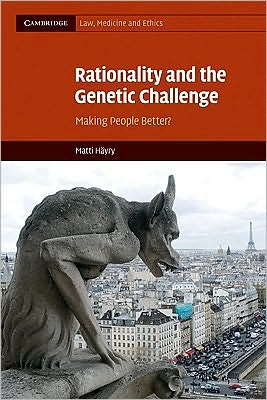

 |

|

Sold Out
Book Categories |
Preface xi
1 Seven ways of making people better 1
1.1 The genetic challenge 1
1.2 The best babies 3
1.3 Deaf embryos 6
1.4 Saviour siblings 9
1.5 Reproductive cloning 11
1.6 Embryonic stem cells 14
1.7 Gene therapies 16
1.8 Considerable life extension 19
1.9 The questions 22
2 Rational approaches to the genetic challenge 24
2.1 Six authors, three approaches 24
2.2 Rational tangibility: Glover and Harris 28
2.3 Moral transcendence; Kass and Sandel 31
2.4 Everybody's acceptance: Habermas and Green 35
2.5 Why none of the approaches is the one 40
2.6 A nonconfrontational notion of rationality 43
2.7 Equilibria, equipoises, and polite bystanders 48
2.8 Plan for the rest of the book 50
3 The best babies and parental responsibility 52
3.1 From infanticide to embryo selection and beyond 52
3.2 Parental responsibility as seen by Plato, Aristotle, Kant, and Mill 55
3.3 Disregard and givenness 58
3.4 Knowledge and moderation 61
3.5 Procreative beneficence as a duty 64
3.6 Arithmetical rationality 67
3.7 Assumed parental roles 70
3.8 Moral limits 72
3.9 Parental rationalities 75
4 Deaf embryos, morality, and the law 78
4.1 Deafness as a test case 78
4.2 Techniques and their uses 79
4.3 Case, options, and stands 80
4.4 Moral case for the ‘medical view’ 81
4.5 Moral case for the ‘social view’ 84
4.6 Case for legal permissiveness 86
4.7 The instability of the situation 87
4.8 Moral case for the ‘medical view’ reconsidered 88
4.9 Moral case for the ‘social view’ reconsidered 90
4.10 Towards a nondirective compromise 92
4.11 The nondirective compromise 94
4.12 Contested rationalities 95
5 Saviour siblings and treating people as a means 99
5.1 Facts and regulations 99
5.2 The logic of the case 101
5.3 What could justify invasive procedures? 103
5.4 Why would noninvasive procedures be a problem? 106
5.5 Rational consent and genetic privacy 108
5.6 Means, mere means, and outcomes 109
5.7 Means, individuals, and values 113
5.8 Green's three readings of Kant 116
5.9 Ends and means: two different principles? 119
5.10 Saving rationalities 122
6 Reproductive cloning and designing human beings 124
6.1 An almost universal condemnation 124
6.2 Distinctions and politics 125
6.3 The case for cautious progress 127
6.4 Arguments for an absolute prohibition 130
6.5 Lack of limits and defective individuals 131
6.6 Asexual reproduction and distorted families 134
6.7 Project of mastery and misshapen communities 136
6.8 Loss of mystery and perverted societies 138
6.9 Forsaken self-understanding and a confused species 140
6.10 Design for a transhuman world 142
6.11 Cloning rationalities 144
7 Embryonic stem cells, vulnerability, and sanctity 146
7.1 What, why, and how regulated? 146
7.2 Alternatives and conjectures 148
7.3 Connections with ethical challenges 152
7.4 Would women be unnecessarily used? 153
7.5 Would women be unfairly used? 156
7.6 Would women be wrongfully used? 160
7.7 The destruction of embryos is always wrong 164
7.8 The destruction of embryos is never wrong 167
7.9 The destruction of embryos is sometimes wrong 169
7.10 Embryonic rationalities 172
8 Gene therapies, hopes, and fears 174
8.1 Trials and errors 174
8.2 Somatic and germ-line interventions 177
8.3 Therapies and enhancements 180
8.4 Construing benefits and harms 182
8.5 Defining values 184
8.6 Technological optimism and pessimism 187
8.7 Technological determinism and voluntarism 189
8.8 Precaution, fear, and hope 190
8.9 Therapeutic rationalities 193
9 Considerable life extension and the meaning of life 195
9.1 Mortality and ageing 195
9.2 Towards considerable longevity 197
9.3 Identity beyond considerable longevity 200
9.4 How mortality benefits individuals 204
9.5 How freedom to choose benefits individuals 206
9.6 From individual immortality to social transcendence 211
9.7 Natural morality and the meaning of life 212
9.8 Immortal rationalities 215
10 Taking the genetic challenge rationally 220
10.1 From challenges to solutions 220
10.2 Basic tenets and their interpretations 220
10.3 Arguments that cut both ways 223
10.4 Arguments for and against 226
10.5 What is required of a complete case? 227
10.6 Measuring the challenge 229
10.7 Sensing the challenge 232
10.8 Negotiating the challenge 234
10.9 The methods of genethics 236
10.10 Taking the genetic challenge nonconfrontationally 237
Bibliography 241
Index 261
Login|Complaints|Blog|Games|Digital Media|Souls|Obituary|Contact Us|FAQ
CAN'T FIND WHAT YOU'RE LOOKING FOR? CLICK HERE!!! X
 You must be logged in to add to WishlistX
 This item is in your Wish ListX
 This item is in your CollectionRationality and the Genetic Challenge: Making People Better?
X
 This Item is in Your InventoryRationality and the Genetic Challenge: Making People Better?
X
 You must be logged in to review the productsX
 X
 X

Add Rationality and the Genetic Challenge: Making People Better?, Should we make people healthier, smarter and longer-lived if genetic and medical advances enable us to do so? Matti Häyry asks this question in the context of genetic testing and selection, cloning and stem cell research, gene therapies and enhancements. , Rationality and the Genetic Challenge: Making People Better? to the inventory that you are selling on WonderClubX
 X

Add Rationality and the Genetic Challenge: Making People Better?, Should we make people healthier, smarter and longer-lived if genetic and medical advances enable us to do so? Matti Häyry asks this question in the context of genetic testing and selection, cloning and stem cell research, gene therapies and enhancements. , Rationality and the Genetic Challenge: Making People Better? to your collection on WonderClub |